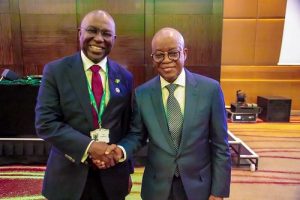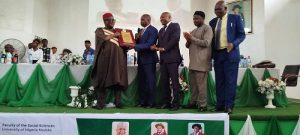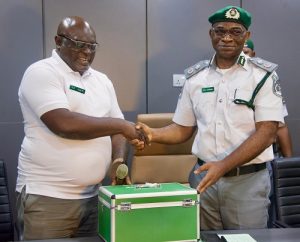Amaechi Inspects Lekki Deep Seaport, Charges Promoters to Invest in Rail Line
Promoters of Lekki deep seaport were on Sunday advised to consider investing in rail lines to address issue of too much pressure on movement of goods on the road.
The Transport Minister, Rotimi Amaechi gave the advice when he inspected the deep blue project, pointing out particularly that the such rail links will have to connect the port to the Lagos-Calabar rail line.
The advice came as the promoters of the project are expected to begin operation in September after receiving cargo handling equipment in June this year.
Stakeholders have expressed concerns over the gridlock that may follow in Lekki once the deep seaport begins operation without a rail link.
Many are of the view that the congestion being suffered in Apapa would be resurface in Lekki except a good rail link is planned.
The Minister after giving the advice also said, “As a Minister of Transportation, I imagine a lot of things that I could have implemented. I imagined that the Lagos-Calabar rail line would start from here; that was my imagination. But the Lagos-Calabar rail project needs $11.1 billion funding.
“This is the first seaport in Nigeria. What we had all these while are river ports. Tin Can is a river port; Apapa is a river port and Port Harcourt is a river port. Right here you have 16.5 meters draft, which is good for the country.
But the country needs more than just one of these ports because of the increase in commercial activities in the future. We need just more than Lagos deep seaport and for me, before I leave office I will emphasise on the construction of the Bonny deep seaport.”
According to Amaechi, the deep seaport is expected to contribute about $360 billion to the Nigerian economy in 45 years time.
The Transport Minister, Rotimi Amaechi gave the advice when he inspected the deep blue project, pointing out particularly that the such rail links will have to connect the port to the Lagos-Calabar rail line.
The advice came as the promoters of the project are expected to begin operation in September after receiving cargo handling equipment in June this year.
Stakeholders have expressed concerns over the gridlock that may follow in Lekki once the deep seaport begins operation without a rail link.
Many are of the view that the congestion being suffered in Apapa would be resurface in Lekki except a good rail link is planned.
The Minister after giving the advice also said, “As a Minister of Transportation, I imagine a lot of things that I could have implemented. I imagined that the Lagos-Calabar rail line would start from here; that was my imagination. But the Lagos-Calabar rail project needs $11.1 billion funding.
“This is the first seaport in Nigeria. What we had all these while are river ports. Tin Can is a river port; Apapa is a river port and Port Harcourt is a river port. Right here you have 16.5 meters draft, which is good for the country.
But the country needs more than just one of these ports because of the increase in commercial activities in the future. We need just more than Lagos deep seaport and for me, before I leave office I will emphasise on the construction of the Bonny deep seaport.”
According to Amaechi, the deep seaport is expected to contribute about $360 billion to the Nigerian economy in 45 years time.





